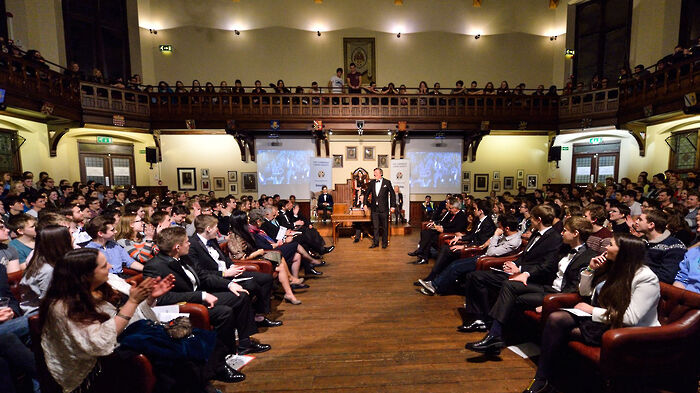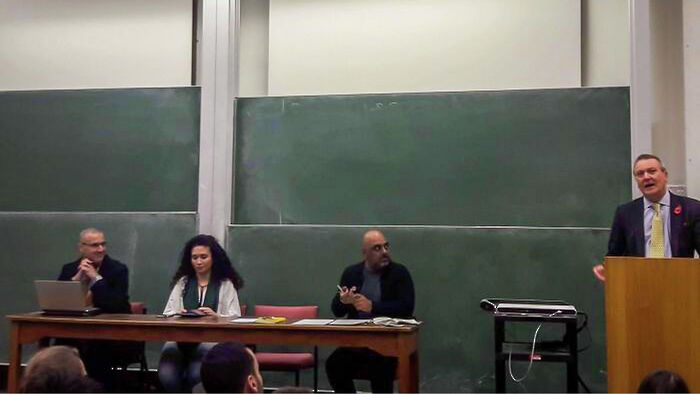Claims of widespread censorship on campuses are ‘exaggerated’, inquiry finds
A new report says restriction of free speech is “not a pervasive problem” in higher education

A parliamentary inquiry formed of MPs and peers has described restrictions to free speech at universities as “serious”, but suggested the spread of censorship across campuses has been exaggerated by the media.
The Joint Committee on Human Rights, a cross-bench group of parliamentarians, released its report into freedom of speech at universities today following weeks of interviews and evidence-gathering.
In its findings, the inquiry concluded “we did not find the wholesale censorship of debate in universities which media coverage has suggested”, saying “it is a serious problem and it is wrong. But it is not a pervasive problem”.
The inquiry, lead by Labour MP Harriet Harman, began its work last year amid concerns that incoherent government policy and intolerant student attitudes were leading to a breakdown of freedom of speech at universities. Actions such as non-platforming and the creation of safe spaces and trigger warnings have all been criticised in sections of the national media as indicative of a growing culture of censorship.
Drawing on evidence from a variety of sources, including university authorities, students, journalists and academics, the inquiry concluded that interference with free speech is “unacceptable”, but that its scale and spread has been overstated.
Though it made headline findings that included restrictions such as “regulatory complexity”, “intolerant attitudes” and “incidents of unacceptable intimidating behaviour”, the full report suggested their impact had not been as significant as claimed in some areas.
“The evidence we have taken shows that overall there is support for the principle of freedom of speech among the student population,” the inquiry said in its summary. It added that “much of the concern” about free speech had emerged from “a small number of incidents which have been widely reported”.
“The press accounts of widespread suppression of free speech are clearly out of kilter with reality,” it found, adding: “A large amount of evidence suggests that the narrative that ‘censorious students’ have created a ‘free speech crisis’ in universities has been exaggerated.”
Nevertheless, the inquiry sounded caution over potential disruption to freedom of speech, and said “any interference with free speech rights in universities is unacceptable and we are concerned that such interference as has been reported could be having a ‘chilling effect’ on the exercise of freedom of speech more widely.”
The inquiry criticised safe spaces, which it said “cannot cover the whole of the university or university life without impinging on right to free speech”.
“Whilst there must be opportunities for genuinely sensitive and confidential discussions in university settings, and whilst the original intention behind safe space policies may have been to ensure that minority or vulnerable groups can feel secure, in practice the concept of safe spaces has proved problematic, often marginalising the views of minority groups,” it said. “They need to co-exist with and respect free speech.”
The University of Cambridge had defended the use of safe spaces in written evidence to the inquiry, saying it “supports unequivocally the right of students to meet in safe spaces”.
The conclusions of the report included a repeated call for the government to review the Prevent counter-terrorism strategy, which the committee found was still widely flawed despite previous criticism. They said the review “should include consideration of its impact on free speech in universities particularly on Muslim students but also on students of other faiths or no religious faiths”.
CUSU submitted evidence to the inquiry which criticised Prevent, citing its implementation as “clear evidence that free speech is being suppressed at the University of Cambridge”, citing controversy over the University’s imposition of a replacement chairperson at a PalSoc discussion in November.
The committee produced guidance for student societies on how to avoid breaking the law whilst handling speaker events, to avoid “confusion and complexity about what is and is not permissible”.
It also recommended that newly-formed regulator the Office for Students should develop guidelines to “ensure university policies proactively secure lawful free speech and are not overly burdensome”.
Harman, the inquiry’s chair, said: “Freedom of speech within the law should mean just that – and it is vital in universities.”
“Evidence to the Joint Committee on Human Rights showed that there is a problem of inhibition of free speech in universities,” she said. “While media reporting has focussed on students inhibiting free speech – and in our report we urge universities to take action to prevent that – free speech is also inhibited by university bureaucracy and restrictive guidance from the Charity Commission.”
 News / Cambridge academics stand out in King’s 2026 Honours List2 January 2026
News / Cambridge academics stand out in King’s 2026 Honours List2 January 2026 Interviews / You don’t need to peak at Cambridge, says Robin Harding31 December 2025
Interviews / You don’t need to peak at Cambridge, says Robin Harding31 December 2025 Comment / What happened to men at Cambridge?31 December 2025
Comment / What happened to men at Cambridge?31 December 2025 News / Varsity’s biggest stories of 202531 December 2025
News / Varsity’s biggest stories of 202531 December 2025 Features / “It’s a momentary expression of rage”: reforming democracy from Cambridge4 January 2026
Features / “It’s a momentary expression of rage”: reforming democracy from Cambridge4 January 2026












